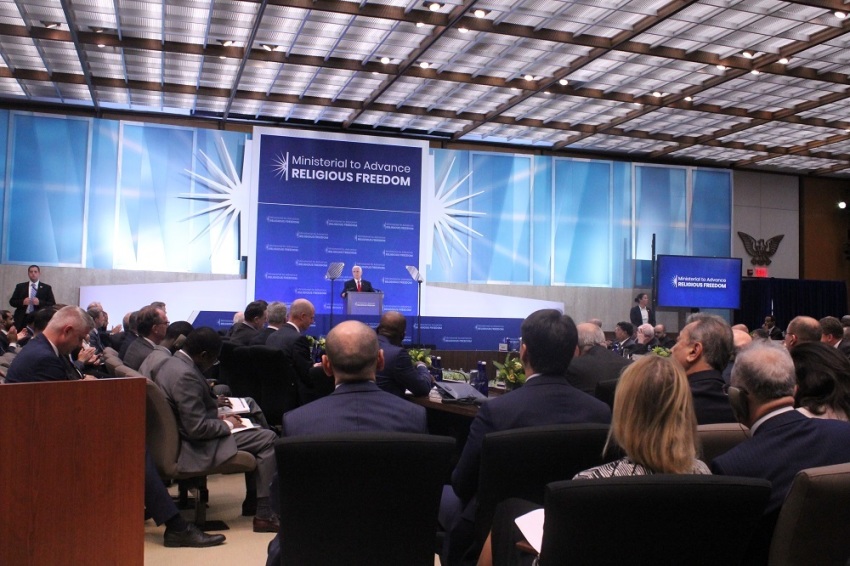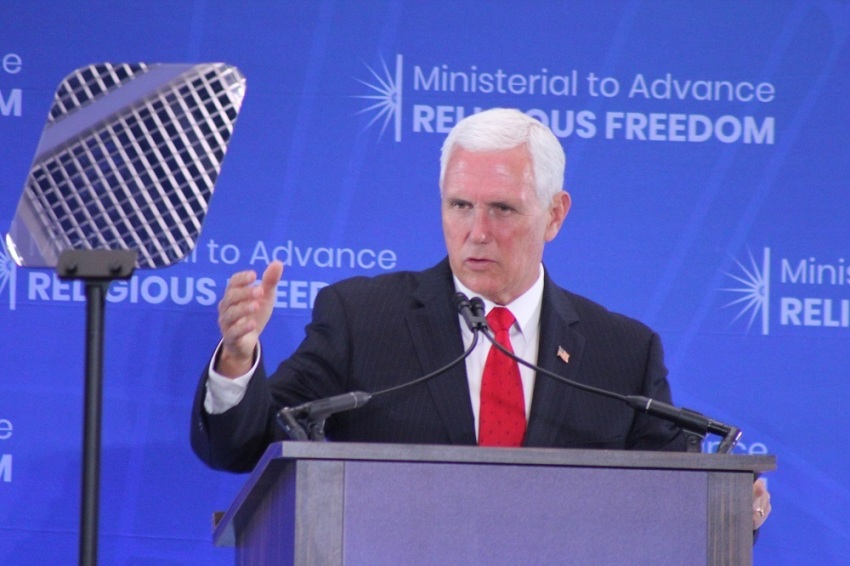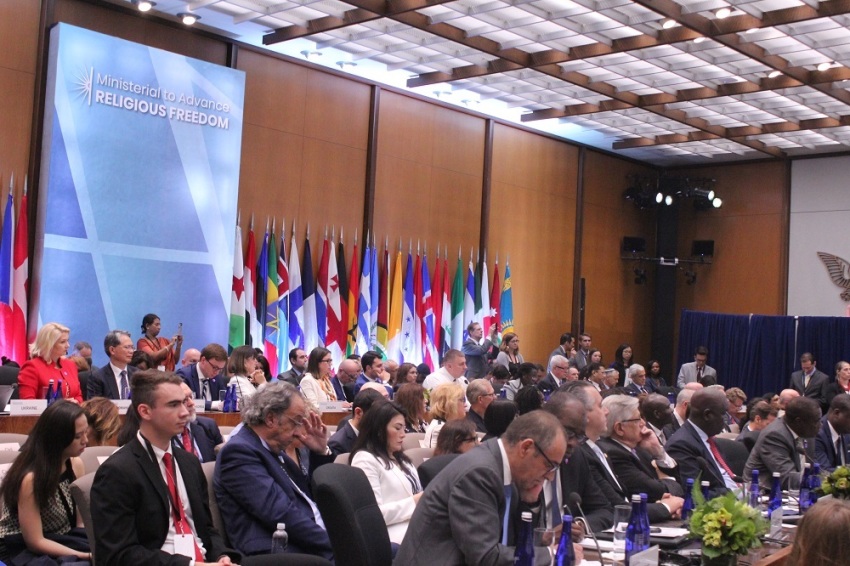Pence announces sanctions on Iranian-backed leaders abusing minorities returning to Iraq

WASHINGTON — Vice President Mike Pence announced new sanctions against Iranian-backed militia leaders accused of committing human rights abuses in the Ninevah Plains of Iraq, where Christians and other religious minorities are struggling to rebuild their lives in the aftermath of genocide.
The former Indiana governor spoke at the State Department’s second Ministerial to Advance Religious Freedom Thursday morning, touching on a wide range of religious freedom concerns around the world while praising a number of survivors of persecution present in the audience.
Pence devoted a small chunk of his speech to criticizing Iran, where countless Christians, Sunni Muslims, and other religious minorities are imprisoned and persecuted for their faith.
While religious freedom abuses inside Iran are well known, Pence criticized Iranian-backed militias that “extort and terrorize people of the Ninevah Plain” of neighboring Iraq. Large swaths of the Ninevah province were previously controlled by the Islamic State, which killed and enslaved thousands upon thousands of religious minorities throughout the region during its years-long reign of control.
In the aftermath of the Islamic State, Advocates have long voiced concern about the Iranian influence in the region as Iran opened up an elementary school, library and mosque in the Christian town of Bartella.
Additionally, Iranian-backed Shite militias have been accused of manning checkpoints, extorting residents and even attacking Iraqi military bases hosting U.S. forces.
At the beginning of the month, Iraqi Prime Minister Adel Abdul Mahdi declared that the country’s Iranian-backed Shiite militias would now fall under Iraqi government control. However, there is some skepticism that the decree can be enforced.
“The United States will not stand idly by while Iranian-backed militias spread terror,” Pence told the hundreds gathered at the Harry S. Truman Building. “And today I am announcing that the United States has placed sanctions on two leaders of these Iranian-backed militias.”
According to the Treasury Department, the sanctions apply to militia leaders Rayan al-Kildani and Waad Qado, as well as two former Iraqi governors Nawfal Hammadi al-Sultan and Ahmed al-Jubouri.
The sanctions are issued in accordance with the Global Magnitsky Human Rights Accountability Act as the leaders are accused of committing abuses in “areas where persecuted religious communities are struggling to recover from the horrors inflicted on them by ISIS.”
“Therefore, today’s sanctions demonstrate solidarity with all Iraqis who oppose corruption and human rights abuse undertaken by public officials, and underscore the Administration’s commitment to supporting the recovery of persecuted religious communities in Iraq,” a press release said.
Al-Kildani is the leader of the 50th Brigade militia who was seen in a video circulated among human rights activists cutting off the ear of a handcuffed detainee.
The Treasury Department accused the 50th Brigade of being the “primary impediment” to the return of internally displaced persons to the Ninevah Plain.”
The brigade is said to have looted homes in the town of Batnaya and illegally seized and sold farmland.
“The local population has accused the group of intimidation, extortion, and harassment of women,” the press release adds.
Qado is accused of leading the 30th battalion, whose members have been accused of extracting money in Bartella through extortion, arrests and kidnappings. Additionally, the U.S. says that the brigade frequently detains people without warrants or with fraudulent warrants.
The Treasury Department reports that members of the local population have accused the 30th Brigade of physical intimidation, extortion, robbery, kidnapping and rape.
Al-Sultan is a former governor of the Ninevah Province who is accused of misusing funds and abusing power. In 2017, the United Nations Development Program suspended reconstruction projects in the province after allegations were made that al-Sultan siphoned U.N. funds.
According to the U.S., Al-Jubouri, the former governor of Salah al-Din, protected his personal interests by “accommodating Iran-backed proxies that operate outside of state control.”
In addition to sanctions related to actions in Ninevah, the Treasury Department announced sanctions Thursday against a network of front companies and agents accused of procuring “sensitive materials for sanctioned elements of Iran’s nuclear program.”
Talking about Iran’s crackdown on unrecognized religious groups, Pence specifically raised the case of Christian pastor Victor Bet Tamraz, whose Farsi-language church was shut down in 2009 by the regime.

The government sentenced Tamraz to 10 years in prison and sentenced his wife to five years in prison. Additionally, Tamraz’s son was charged to four months in prison for the crime of “spreading Christian propaganda.”
“Pastor Bet Tamraz and his family are an inspiration to freedom-loving people the world over, and we couldn’t be more honored to have his daughter, Dabrina, here with us today,” Pence said, before asking Dabrina Bet Tamraz to stand for recognition and applause.
Tamraz was among the 27 survivors of religious persecution who met with President Donald Trump on Wednesday. Tamraz asked Trump in the meeting to raise her family’s case and Christian persecution in “all negotiations with Iran.”
On Thursday afternoon, the U.S. was joined by Ukraine, Kosovo, Marshall Islands and the United Arab Emirates in signing a statement condemning the persecution in Iran. The statement called out the government’s treatment of the Bahai community.
The statement singles out Judge Mashallah Ahmadzadeh and other revolutionary court judges who have sentenced religious minorities to severe prison sentences, including Tamraz and Pastor Youcef Nadarkhani, who were convicted on charges related to peaceful activities.
“Last year, the Iranian government sentenced more than 200 Gonabadi Sufis to lengthy prison terms and other harsh punishments after security forces cracked down on Gonabadi Sufis peacefully protesting the detention of one of their fellow faith members,” the statement of concern adds.
Pence assured that the U.S. stands with all victims of religious persecution, including those who have no faith.
Pence called on the Saudi government to release imprisoned atheist blogger Raif Badawi, who has been tortured while serving a 10-year prison sentence after being charged with insulting Islam online.
He also raised the case of blogger and journalist Mohamed Cheikh Ould Mohamed, who in 2014 was sentenced to death in Mauritania for his criticism of Islam in an article criticizing the country’s caste system titled "Religion, religiosity and craftsmen.”
The vice president also called on Eritrea, which ranks seventh on the Open Doors 2019 USA World Watch List for global Christian persecution, to release Orthodox Patriarch Abune Antonios. Antonios has been detained since May 2007 after he pushed back against state interference and refused government requests for him to excommunicate 3,000 members.
Pence slammed Pakistan for the solitary confinement of professor Junaid Hafeez, who denies claims that he posted blasphemous remarks on Facebook. Hafeez was charged with “criticizing Islam through electronic means.”
“All four of these men have stood strong in defense of religious liberty despite unimaginable pressure, and the American people stand with them,” Pence said. “And so today the United States calls upon the governments of Eritrea, Mauritania, Pakistan, and Saudi Arabia to respect the freedom of conscience and let these men go.”
Pence also warned of the antisemitism on the rise in Europe and implied that some U.S. House Democrats should reign in their antisemitism.
“In France and Germany, things have gotten so bad that Jewish religious leaders have warned their followers not to wear kippahs in public for fear that they could be violently attacked, and attacks on Jews, even on Holocaust survivors, are growing at an alarming rate,” he said. “And regrettably, the world’s oldest hatred has found a voice in the halls of our United States Congress.”
According to the State Department, the ministerial was attended by officials from 106 nations and over 900 civil society leaders, religious leaders, advocates and survivors of persecution.

Since President Donald Trump took office, his administration has vowed to promote international religious freedom like never before and began with the appointment of then-sitting Kansas Gov. Sam Brownback to head the State Department’s International Religious Freedom Office. The former U.S. senator is the most politically accomplished person ever to hold the position.
The administration hosted its first ministerial on the issue last July, where it announced the creation of the International Religious Freedom Fund and the Genocide Recovery and Persecution Response Program to help rebuild communities devastated by the Islamic State.
Last year, the administration also rolled out the Potomac Declaration, a Plan of Action and several statements of concern.
This year, the administration was determined to build on its success from last year. And on Thursday morning, Secretary of State Mike Pompeo announced a new initiative that creates a forum for dialogue on global religious liberty called the International Religious Freedom Alliance.
“Under this president, we will respect the sovereignty and diverse cultures of every nation, but I promise all of you America will continue to be that city on a hill that John Winthrop spoke about,” Pence assured. “We will always continue to stand for the freedom to live, work, and worship according to the dictates of your conscience, and freedom of religion will always be an American anthem.”
Follow Samuel Smith on Twitter: @IamSamSmith
or Facebook: SamuelSmithCP



























